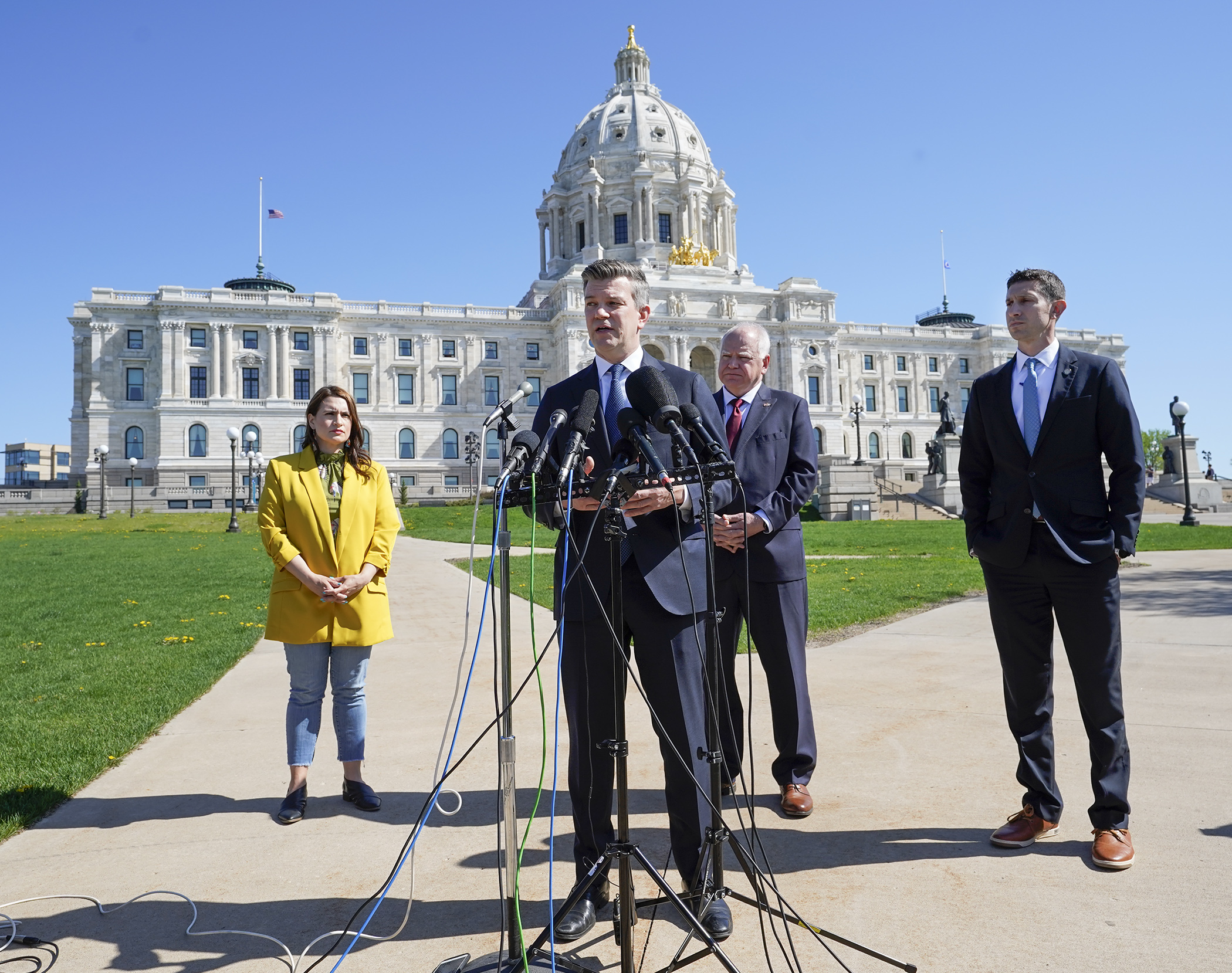Bipartisan framework of session-ending deal includes education investments, tax cuts

(UPDATED 6:42 p.m.)
On Monday in St. Paul, the sun is shining, the sky is bright blue and Gov. Tim Walz and legislative leaders have reached agreement on a framework to end the 2022 legislative session.
The deal calls for $4 billion toward a tax bill and a $1.4 billion capital investment bill. It also includes additional spending of $1 billion in education, $1 billion for health care and human services, and $450 million for public safety. Additional investments are to come from a $1.32 billion pot. Left on the bottom line is $4 billion to help the state manage future economic uncertainty.
“There’s an awful lot of the hard work of democracy to be done this week, but the parameters have been set and they’ve been done in a way that I think should make Minnesotans proud,” Walz said.
Added House Majority Leader Ryan Winkler (DFL-Golden Valley): “We are looking at a budget agreement today that will help Minnesotans better afford the cost of living, to help them afford child care and housing. We’re looking at a budget agreement to help Minnesotans recover from two of the toughest years in our state’s history. … Investments contained in this budget agreement will make big differences in the lives of millions of people.”
And those investments are?
Senate Majority Leader Jeremy Miller (R-Winona) said he expects conference committees to finalize deals soon.
“My message to the conference committee members is focus on areas of agreement. There is not much time to get this done before the end of session. Some of these larger bills need to be agreed to and wrapped up probably by Wednesday at the latest.”
Session must end by May 23; however, per the state constitution, bills cannot be passed on the final day of the biennial session. Walz feels “pretty confident” work will get done on time.
The governor has repeatedly said he will not call a special session, but wouldn’t repeat that when asked again Monday.
“Deadlines are magical to what’s happening here; they are magical and they start to get things done,” he said.
Walz did speak highly of the reluctance to spend every dime of the projected state surplus.
“I think it shows great foresight, and it shows great restraint to be quite honest, to keep money on the bottom line in case the economic forecasts are the way they’re looking to don’t put the state in a bad situation.”
When it comes to taxes, are so-called “Walz checks” still on the table? Where will taxes be cut?
“Republicans are focused on permanent, ongoing tax relief. We know that’s going to be a big part of the tax relief package. We need to get more guidance from the conference committee members to see where things shake out,” Miller said. “There have been no final decisions on really anything at this point otherwise we’d have the bills done and on the governor’s desk.”
In a statement, House Speaker Melissa Hortman (DFL-Brooklyn Park) said: “We have reached a bipartisan agreement on a budget framework that makes strong investments in families' economic security, education, health care, and public safety to address the challenges Minnesotans are facing. These investments are in addition to the budget we passed last year and the frontline worker bonuses that we got across the finish line last month. This is a positive step forward, but there is a lot more work ahead of us in this final week of the legislative session.”
Not all members believe expenses are needed.
“This is a terrible deal that needlessly spends your tax dollars,” Rep. Steve Drazkowski (R-Mazeppa) said in a statement. “In 2021, we passed a two-year budget that fully funded every facet of state government through June of 2023. There is no reason to spend one more dime of taxpayer money. This year was supposed to be about policy, not our budget. However, spend-happy politicians are addicted to wasting your money so they can look busy and feel good.”
Related Articles
Search Session Daily
Advanced Search OptionsPriority Dailies
Speaker Emerita Melissa Hortman, husband killed in attack
By HPIS Staff House Speaker Emerita Melissa Hortman (DFL-Brooklyn Park) and her husband, Mark, were fatally shot in their home early Saturday morning.
Gov. Tim Walz announced the news dur...
House Speaker Emerita Melissa Hortman (DFL-Brooklyn Park) and her husband, Mark, were fatally shot in their home early Saturday morning.
Gov. Tim Walz announced the news dur...
Lawmakers deliver budget bills to governor's desk in one-day special session
By Mike Cook About that talk of needing all 21 hours left in a legislative day to complete a special session?
House members were more than up to the challenge Monday. Beginning at 10 a.m...
About that talk of needing all 21 hours left in a legislative day to complete a special session?
House members were more than up to the challenge Monday. Beginning at 10 a.m...